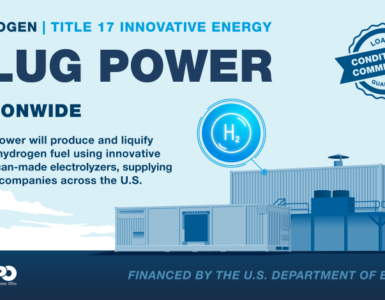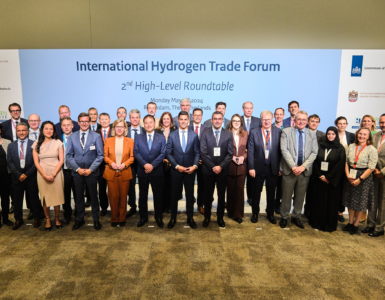DOE announces $52,5M to accelerate progress in clean hydrogen.
The U.S. Department of Energy (DOE) announced $52.5 million to fund 31 projects to advance next-generation clean hydrogen technologies and support DOE’s recently announced Hydrogen Energy Earthshot initiative to reduce the cost and accelerate breakthroughs in the clean hydrogen sector. Clean hydrogen is a form of renewable energy that—if made cheaper and easier to produce—can have a major role in supporting President Biden’s commitment to tackling the climate crisis.
Jennifer M. Granholm, Secretary of Energy.
Part of our path to a net-zero carbon future means investing in innovation to make clean energy sources like hydrogen more affordable and widely adopted so we can reach our goal of net-zero carbon emissions by 2050.
“These projects will put us one step closer to unlocking the scientific advancements needed to create a strong domestic supply chain and good-paying jobs in the emerging clean hydrogen industry.”
🔥 What about we co-host a webinar? Let's educate, captivate, and convert the hydrogen economy!
Hydrogen Central is the global go-to online magazine for the hydrogen economy, we can help you host impactful webinars that become a global reference on your topic and are an evergreen source of leads. Click here to request more details
Hydrogen is a clean fuel that—when combined with oxygen in a fuel cell—produces electricity with water and heat as by-products. Hydrogen can be produced from a variety of resources, such as natural gas, nuclear power, biomass, and renewable power like solar and wind.
These qualities make it an attractive fuel option and input for transportation, electricity generation and industrial applications, such as in trucks, buildings, and manufacturing.
These 31 projects will focus on bridging technical gaps in hydrogen production, storage, distribution and utilization technologies, including fuel cells, thereby paving the way toward decarbonization of the electricity sector by 2035 and creation of good-paying jobs across in the hydrogen sector.
Joe Manchin, U.S. Senator, Chairman of the Senate Energy and Natural Resources Committee.
West Virginia University continues to utilize our state’s vast natural gas resources to tackle some of the toughest challenges in industrial research, including by developing clean, innovative ways to produce hydrogen – a fuel that’s increasingly important to our economy and has potential to decarbonize our energy systems, industrial processes, and the transportation sector.
“The announcement is further acknowledgement of the importance of the groundbreaking research conducted by WVU’s students and faculty and the ongoing partnership with the U.S. Department of Energy and National Energy Technology Laboratory. I’m thrilled to see the National Energy Technology Laboratory continue to invest in WVU and I will continue to push for funding that supports research projects in the Mountain State.”
U.S. Representative Marcy Kaptur, Chairwoman of the House Energy and Water Development Appropriations Subcommittee.
Next-generation hydrogen technologies, including fuel cells, will be critical to addressing the climate crisis and developing new industries here at home.
“This will help to create and bring back good-paying jobs, and we must continue to innovate and lead in these areas so our nation is not left behind.”
Shelley Moore, U.S. Senator Capito.
It’s critical we support an all-of-the-above approach and invest in a variety of technologies, including hydrogen.
“West Virginia University’s top-notch facilities, students and faculty, and research capacity make it a perfect place to make the most of this investment to develop and accelerate breakthroughs in clean energy.”
Paul D. Tonko, U.S. Representative.
Clean hydrogen is a flexible low-emissions fuel with countless applications across every sector of our economy.
“It will be vital to achieving clean energy targets, especially in some of the hardest-to-clean sectors of the American economy.
“These U.S. Department of Energy investments will help in that effort, sparking American innovation and helping translate that innovation into lasting, sustainable American production and jobs. My heartfelt congratulations and thanks to Plug Power for earning this award and for all the work and resources they have put into advancing the use and economic potential of clean hydrogen.”
David B. McKinley, U.S. Representative.
Advancing hydrogen technologies is critical to lowering emissions here at home and around the world.
“West Virginia University and National Energy Technology Laboratory are at the forefront of hydrogen research and development. Moving forward we must continue to empower our scientific communities through initiatives like the Hydrogen Energy Moonshot to lower the cost of hydrogen and other clean energy technologies.”
Scott Peters, U.S. Representative.
In our fight against climate change, it is critical we invest in the development and deployment of innovative alternative energy technologies.
“The research funding awarded to Solar Turbines Incorporated and The Regents of the University of California, San Diego will go a long way in advancing clean hydrogen technology as an accessible, cost-effective, and potentially game-changing fuel source to power our country while also helping to ensure we reach our climate goals.”
Sharice Davids, U.S. Representative.
I am excited that Tallgrass Energy has been selected as one of 31 companies to receive federal funding for their next-generation clean energy project.
“The Kansas Third District is an engine of innovation, and these funds will improve access to carbon-neutral fuel, create good-paying jobs, and help tackle climate change,”
“Congratulations again to Tallgrass Energy for their selection by the Department of Energy’s Hydrogen Energy Earthshot initiative, and I look forward to seeing their progress.”
Nikema Williams, U.S. Representative.
We need to invest in clean energy technologies now to be a net zero emissions country by 2050.
“The announcement from the Department of Energy shows that Georgia Tech and the Fifth District are leading the way to achieve that goal. This federal funding will bolster the Georgia Institute of Technology’s project to reduce the commercial costs of renewable hydrogen fuel and make clean energy more accessible for ALL. The Fifth District will continue innovating and creating new technologies to create good-paying jobs while addressing the climate crisis head-on.”
DOE funding includes $36 million from the Department’s Office of Energy Efficiency and Renewable Energy (EERE) and $16.5 million from the Office of Fossil Energy and Carbon Management (FECM).
EERE-supported efforts under this announcement include 19 projects on the following topics:
- Electrolysis, a process to produce hydrogen using electricity and water, with improved manufacturing methods and streamlined assembly to reduce cost.
- Clean hydrogen production, including biological and electrochemical approaches.
- Fuel cell subsystems and components that are more efficient, durable, and designed for heavy-duty applications.
- Domestic hydrogen supply chain components and refueling technologies.
- Analyses to assess the cost and performance of fuel cell systems, hydrogen production pathways, and hydrogen storage technologies.
FECM-supported efforts under this announcement include 12 projects on the following topics:
- Degradation mechanisms and pathways in high temperature reversible solid oxide cells (SOC) materials that helps assess metrics about cost, performance, durability.
- Performance, reliability, and durability for hydrogen production using reversible solid oxide cells (R-SOC) systems.
- Cost reductions via improvements in materials, manufacturing and microstructure improvements in R-SOC technologies for hydrogen production.
- Initial engineering design of a commercial-scale advanced carbon capture, utilization, and storage (CCUS) system from steam methane reforming plants.
- Initial engineering design of a commercial-scale advanced CCUS system from autothermal methane reforming plants
- Development of a gas turbine combustion system for 100 percent hydrogen fired and mixtures of hydrogen and natural gas.
- Projects Support DOE’s Recently Announced Hydrogen Energy Earthshot to Lower Cost, Advance Breakthroughs for Clean Hydrogen Technology
READ the latest news shaping the hydrogen market at Hydrogen Central
DOE Announces $52.5 Million to Accelerate Progress in Clean Hydrogen, WASHINGTON, D.C., July 7, 2021








